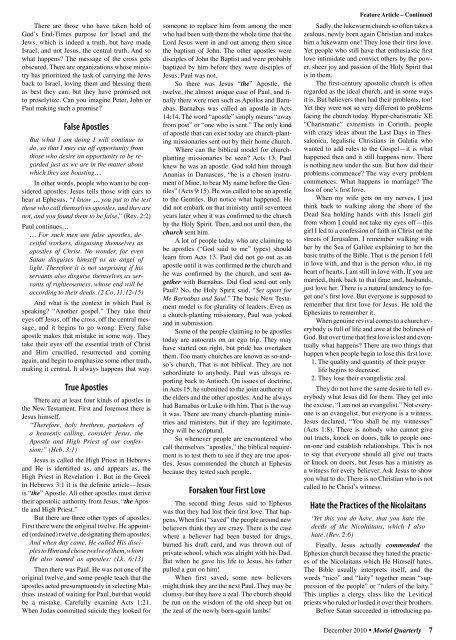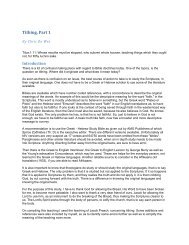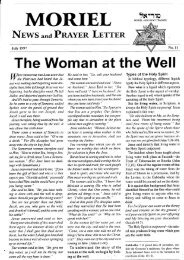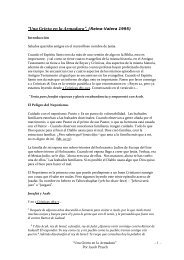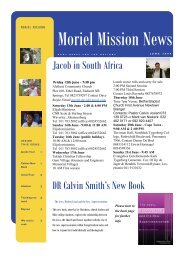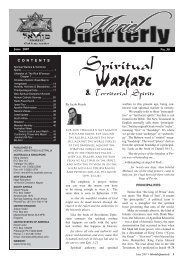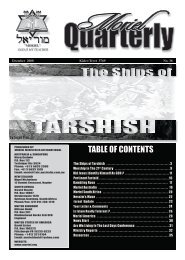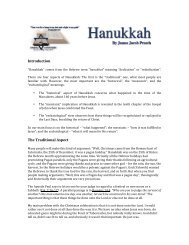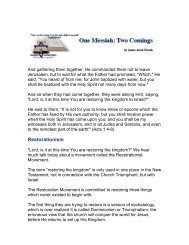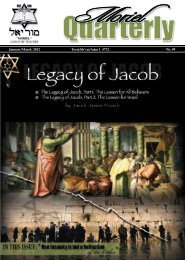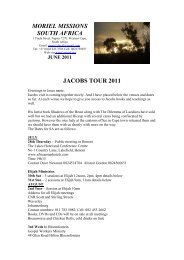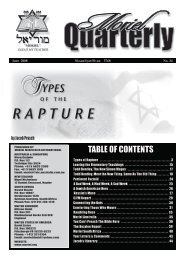Ephesus - Moriel Ministries
Ephesus - Moriel Ministries
Ephesus - Moriel Ministries
Create successful ePaper yourself
Turn your PDF publications into a flip-book with our unique Google optimized e-Paper software.
There are those who have taken hold of<br />
God’s End-Times purpose for Israel and the<br />
Jews, which is indeed a truth, but have made<br />
Israel, and not Jesus, the central truth. And so<br />
what happens The message of the cross gets<br />
obscured. There are organizations whose ministry<br />
has prioritized the task of carrying the Jews<br />
back to Israel, loving them and blessing them<br />
as best they can, but they have promised not<br />
to proselytize. Can you imagine Peter, John or<br />
Paul making such a promise<br />
False Apostles<br />
But what I am doing I will continue to<br />
do, so that I may cut off opportunity from<br />
those who desire an opportunity to be regarded<br />
just as we are in the matter about<br />
which they are boasting…<br />
In other words, people who want to be considered<br />
apostles. Jesus tells those with ears to<br />
hear at <strong>Ephesus</strong>, “I know … you put to the test<br />
those who call themselves apostles, and they are<br />
not, and you found them to be false.” (Rev. 2:2)<br />
Paul continues…<br />
… For such men are false apostles, deceitful<br />
workers, disguising themselves as<br />
apostles of Christ. No wonder, for even<br />
Satan disguises himself as an angel of<br />
light. Therefore it is not surprising if his<br />
servants also disguise themselves as servants<br />
of righteousness, whose end will be<br />
according to their deeds. (2 Co. 11:12-15)<br />
And what is the context in which Paul is<br />
speaking “Another gospel.” They take their<br />
eyes off Jesus, off the cross, off the central message,<br />
and it begins to go wrong. Every false<br />
apostle makes that mistake in some way. They<br />
take their eyes off the essential truth of Christ<br />
and Him crucified, resurrected and coming<br />
again, and begin to emphasize some other truth,<br />
making it central. It always happens that way.<br />
True Apostles<br />
There are at least four kinds of apostles in<br />
the New Testament. First and foremost there is<br />
Jesus himself.<br />
“Therefore, holy brethren, partakers of<br />
a heavenly calling, consider Jesus, the<br />
Apostle and High Priest of our confession;”<br />
(Heb. 3:1)<br />
Jesus is called the High Priest in Hebrews<br />
and He is identified as, and appears as, the<br />
High Priest in Revelation 1. But in the Greek<br />
in Hebrews 3:1 it is the definite article—Jesus<br />
is “the” Apostle. All other apostles must derive<br />
their apostolic authority from Jesus, “the Apostle<br />
and High Priest.”<br />
But there are three other types of apostles.<br />
First there were the original twelve. He appointed<br />
(ordained) twelve, designating them apostles.<br />
And when day came, He called His disciples<br />
to Him and chose twelve of them, whom<br />
He also named as apostles: (Lk. 6:13)<br />
Then there was Paul. He was not one of the<br />
original twelve, and some people teach that the<br />
apostles acted presumptuously in selecting Matthias<br />
instead of waiting for Paul, but that would<br />
be a mistake. Carefully examine Acts 1:21.<br />
When Judas committed suicide they looked for<br />
someone to replace him from among the men<br />
who had been with them the whole time that the<br />
Lord Jesus went in and out among them since<br />
the baptism of John. The other apostles were<br />
disciples of John the Baptist and were probably<br />
baptized by him before they were disciples of<br />
Jesus. Paul was not.<br />
So there was Jesus “the” Apostle, the<br />
twelve, the almost unique case of Paul, and finally<br />
there were men such as Apollos and Barnabas.<br />
Barnabas was called an apostle in Acts<br />
14:14. The word “apostle” simply means “away<br />
from post” or “one who is sent.” The only kind<br />
of apostle that can exist today are church-planting<br />
missionaries sent out by their home church.<br />
Where can the biblical model for churchplanting<br />
missionaries be seen Acts 13, Paul<br />
knew he was an apostle. God told him through<br />
Ananias in Damascus, “he is a chosen instrument<br />
of Mine, to bear My name before the Gentiles”<br />
(Acts 9:15). He was called to be an apostle<br />
to the Gentiles. But notice what happened. He<br />
did not embark on that ministry until seventeen<br />
years later when it was confirmed to the church<br />
by the Holy Spirit. Then, and not until then, the<br />
church sent him.<br />
A lot of people today who are claiming to<br />
be apostles (“God said to me” types) should<br />
learn from Acts 13. Paul did not go out as an<br />
apostle until it was confirmed to the church and<br />
he was confirmed by the church, and sent together<br />
with Barnabas. Did God send out only<br />
Paul No, the Holy Spirit said, “Set apart for<br />
Me Barnabas and Saul.” The basic New Testament<br />
model is for plurality of leaders. Even as<br />
a church-planting missionary, Paul was yoked<br />
and in submission.<br />
Some of the people claiming to be apostles<br />
today are autocrats on an ego trip. They may<br />
have started out right, but pride has overtaken<br />
them. Too many churches are known as so-andso’s<br />
church. That is not biblical. They are not<br />
subordinate to anybody. Paul was always reporting<br />
back to Antioch. On issues of doctrine,<br />
in Acts 15, he submitted to the joint authority of<br />
the elders and the other apostles. And he always<br />
had Barnabas or Luke with him. That is the way<br />
it was. There are many church-planting ministries<br />
and ministers, but if they are legitimate,<br />
they will be scriptural.<br />
So whenever people are encountered who<br />
call themselves “apostles,” the biblical requirement<br />
is to test them to see if they are true apostles.<br />
Jesus commended the church at <strong>Ephesus</strong><br />
because they tested such people.<br />
Forsaken Your First Love<br />
The second thing Jesus said to <strong>Ephesus</strong><br />
was that they had lost their first love. That happens.<br />
When first “saved” the people around new<br />
believers think they are crazy. There is the case<br />
where a believer had been busted for drugs,<br />
burned his draft card, and was thrown out of<br />
private school, which was alright with his Dad.<br />
But when he gave his life to Jesus, his father<br />
pulled a gun on him!<br />
When first saved, some new believers<br />
might think they are the next Paul. They may be<br />
clumsy, but they have a zeal. The church should<br />
be run on the wisdom of the old sheep but on<br />
the zeal of the newly born-again lambs!<br />
Feature Article – Continued<br />
Sadly, the lukewarm church so often takes a<br />
zealous, newly born again Christian and makes<br />
him a lukewarm one! They lose their first love.<br />
Yet people who still have that enthusiastic first<br />
love intimidate and convict others by the power,<br />
sheer joy and passion of the Holy Spirit that<br />
is in them.<br />
The first-century apostolic church is often<br />
regarded as the ideal church, and in some ways<br />
it is. But believers then had their problems, too!<br />
Yet they were not so very different to problems<br />
facing the church today. Hyper-charismatic XE<br />
“Charismatic” extremists in Corinth, people<br />
with crazy ideas about the Last Days in Thessalonica,<br />
legalistic Christians in Galatia who<br />
wanted to add rules to the Gospel—it is what<br />
happened then and it still happens now. There<br />
is nothing new under the sun. But how did their<br />
problems commence The way every problem<br />
commences. What happens in marriage The<br />
loss of one’s first love.<br />
When my wife gets on my nerves, I just<br />
think back to walking along the shore of the<br />
Dead Sea holding hands with this Israeli girl<br />
from whom I could not take my eyes off—this<br />
girl I led to a confession of faith in Christ on the<br />
streets of Jerusalem. I remember walking with<br />
her by the Sea of Galilee explaining to her the<br />
basic truths of the Bible. That is the person I fell<br />
in love with, and that is the person who, in my<br />
heart of hearts, I am still in love with. If you are<br />
married, think back to that time and, husbands,<br />
just love her. There is a natural tendency to forget<br />
one’s first love. But everyone is supposed to<br />
remember that first love for Jesus. He told the<br />
Ephesians to remember it.<br />
When genuine revival comes to a church everybody<br />
is full of life and awe at the holiness of<br />
God. But over time that first love is lost and eventually<br />
what happens There are two things that<br />
happen when people begin to lose this first love:<br />
1. The quality and quantity of their prayer<br />
life begins to decrease.<br />
2. They lose their evangelistic zeal.<br />
They do not have the same desire to tell everybody<br />
what Jesus did for them. They get into<br />
the excuse, “I am not an evangelist.” Not everyone<br />
is an evangelist, but everyone is a witness.<br />
Jesus declared, “You shall be my witnesses”<br />
(Acts 1:8). There is nobody who cannot give<br />
out tracts, knock on doors, talk to people oneon-one<br />
and establish relationships. This is not<br />
to say that everyone should all give out tracts<br />
or knock on doors, but Jesus has a ministry as<br />
a witness for every believer. Ask Jesus to show<br />
you what to do. There is no Christian who is not<br />
called to be Christ’s witness.<br />
Hate the Practices of the Nicolaitans<br />
‘Yet this you do have, that you hate the<br />
deeds of the Nicolaitans, which I also<br />
hate. (Rev. 2:6)<br />
Finally, Jesus actually commended the<br />
Ephesian church because they hated the practices<br />
of the Nicolaitans which He Himself hates.<br />
The Bible usually interprets itself, and the<br />
words “nico” and “laity” together mean “suppression<br />
of the people” or “rulers of the laity.”<br />
This implies a clergy class like the Levitical<br />
priests who ruled or lorded it over their brothers.<br />
Before Satan succeeded in introducing pa-<br />
December 2010 • <strong>Moriel</strong> Quarterly


